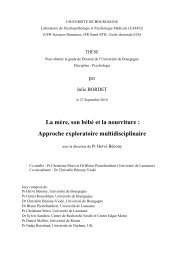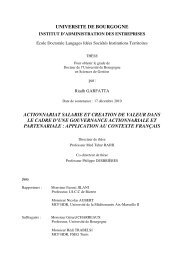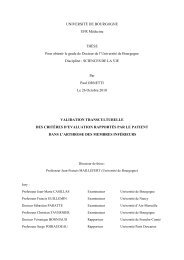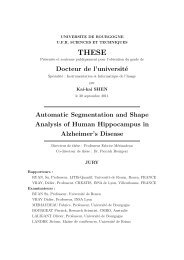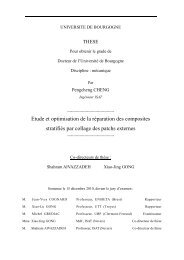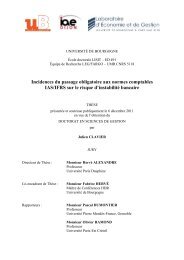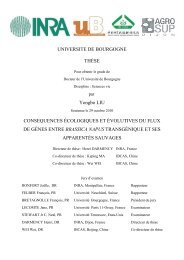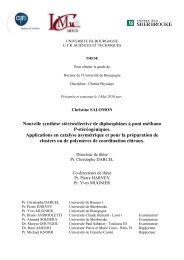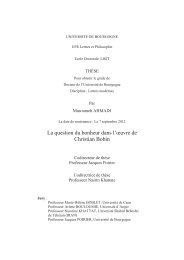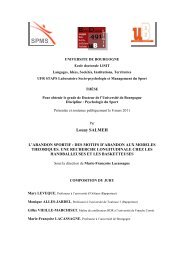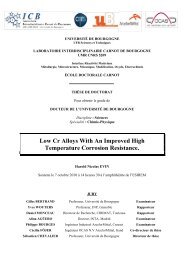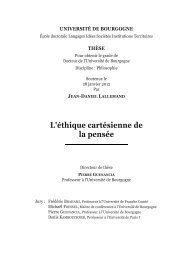TH`ESE A NEW INVARIANT OF QUADRATIC LIE ALGEBRAS AND ...
TH`ESE A NEW INVARIANT OF QUADRATIC LIE ALGEBRAS AND ...
TH`ESE A NEW INVARIANT OF QUADRATIC LIE ALGEBRAS AND ...
You also want an ePaper? Increase the reach of your titles
YUMPU automatically turns print PDFs into web optimized ePapers that Google loves.
4.4. Symmetric Novikov algebras<br />
(2) If I is non-degenerate then so is I ⊥ and N = I ⊥<br />
⊕ I ⊥ .<br />
Proof.<br />
(1) Since B(xN,I) = B(x,NI) = 0 and B(I,Nx) = B(IN,x) = 0, for all x ∈ I ⊥ then I ⊥ is<br />
also an ideal of N. Let x ∈ II ⊥ , i.e. x = yz with y ∈ I,z ∈ I ⊥ then B(x,N) = B(yz,N) =<br />
B(y,zN) = 0. Therefore x = 0. That means II ⊥ = {0}. Similarly, one gains I ⊥ I = {0}.<br />
(2) Assume that I ⊥ is degenerate, that means there is a non-zero x ∈ I ⊥ such that B(x,I ⊥ ) =<br />
0. Therefore, x ∈ I. However, B(x,I) = 0 since x ∈ I ⊥ so I is degenerate (that is a<br />
contradiction). Hence, I ⊥ must be non-degenerate.<br />
Let x ∈ I ∩ I⊥ then B(x,I) = 0. Since I is non-degenerate, one has x = 0. That means<br />
I ∩ I⊥ = {0} and N = I ⊥<br />
⊕ I⊥ .<br />
Proposition 4.4.6. Let Z(N) = {x ∈ N | xy = yx, ∀ y ∈ N} the center of N and denote by<br />
As(N) = {x ∈ N | (x,y,z) = 0, ∀ y,z ∈ N}. One has<br />
(1) If N is a Novikov algebra then Z(N) ⊂ N(N) where N(N) = {x ∈ N | (x,y,z) = (y,x,z) =<br />
(y,z,x) = 0, ∀ y,z ∈ N} is the nucleus of N (see Definition 4.1.11 (3)). Moreover, if N is<br />
also commutative then N(N) = N = As(N) (that means N is an associative algebra).<br />
(2) If (N,B) is a symmetric Novikov algebra then<br />
Proof.<br />
(i) Z(N) = [g(N),g(N)] ⊥<br />
(ii) N(N) = As(N) = (N,N,N) ⊥ .<br />
(iii) LAnn(N) = RAnn(N) = Ann(N) = (N 2 ) ⊥ .<br />
(1) Assume that x is an element in Z(N). For all y,z ∈ N, one has:<br />
(x,y,z) = (xy)z − x(yz) = (yx)z − x(yz) = (yz)x − x(yz) = 0.<br />
By (III), we also have (y,x,z) = 0. Moreover, since<br />
(y,z,x) = (yz)x − y(zx) = x(yz) − y(xz)<br />
= (xy)z − (x,y,z) − (yx)z + (y,x,z) = (xy)z − (yx)z = 0<br />
one obtains Z(N) ⊂ N(N). If N is commutative then Z(N) = N. Certainly, Z(N) =<br />
N(N) = N.<br />
(2) Let (N,B) be a symmetric Novikov algebra.<br />
(i) It is obvious since g(N) is a quadratic Lie algebra and Z(N) is its center.<br />
117



